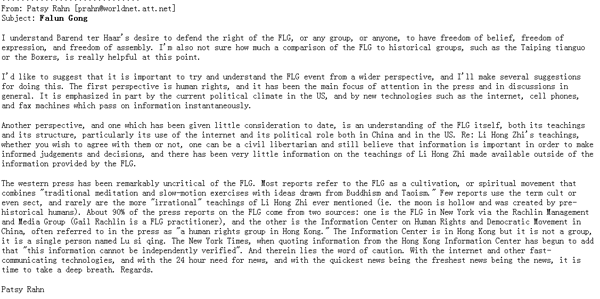I understand Barend ter Haar's desire to defend the right of the FLG, or any group, or anyone, to have freedom of belief, freedom of expression, and freedom of assembly. I'm also not sure how much a comparison of the FLG to historical groups, such as the Taiping tianguo or the Boxers, is really helpful at this point.
I'd like to suggest that it is important to try and understand the FLG event from a wider perspective, and I'll make several suggestions for doing this. The first perspective is human rights, and it has been the main focus of attention in the press and in discussions in general. It is emphasized in part by the current political climate in the US, and by new technologies such as the internet, cell phones, and fax machines which pass on information instantaneously.
Another perspective, and one which has been given little consideration to date, is an understanding of the FLG itself, both its teachings and its structure, particularly its use of the internet and its political role both in China and in the US. Re: Li Hong Zhi's teachings, whether you wish to agree with them or not, one can be a civil libertarian and still believe that information is important in order to make informed judgements and decisions, and there has been very little information on the teachings of Li Hong Zhi made available outside of the information provided by the FLG.
The western press has been remarkably uncritical of the FLG. Most reports refer to the FLG as a cultivation, or spiritual movement that combines "traditional meditation and slow-motion exercises with ideas drawn from Buddhism and Taoism." Few reports use the term cult or even sect, and rarely are the more "irrational" teachings of Li Hong Zhi ever mentioned (ie. the moon is hollow and was created by pre-historical humans). About 90% of the press reports on the FLG come from two sources: one is the FLG in New York via the Rachlin Management and Media Group (Gail Rachlin is a FLG practitioner), and the other is the Information Center on Human Rights and Democratic Movement in China, often referred to in the press as "a human rights group in Hong Kong." The Information Center is in Hong Kong but it is not a group, it is a single person named Lu si qing. The New York Times, when quoting information from the Hong Kong Information Center has begun to add that "this information cannot be independently verified". And therein lies the word of caution. With the internet and other fast-communicating technologies, and with the 24 hour need for news, and with the quickest news being the freshest news being the news, it is time to take a deep breath. Regards.
Patsy Rahn
(Kenyon.edu,March 2, 2000 )

Original text from: http://www2.kenyon.edu/Depts/Religion/Fac/Adler/Reln270/FalunGong/c-10.htm





